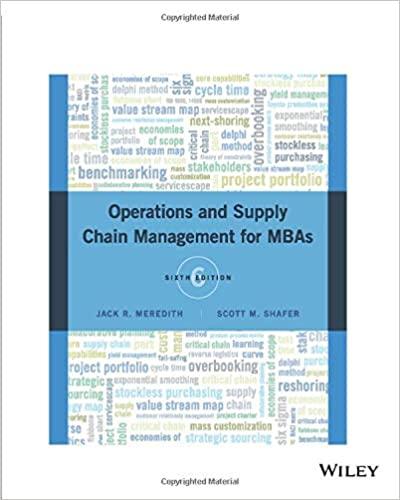Taracare, Inc. operates a single factory in Ensenada, Mexico, where it fabricates and assembles a wide range
Question:
Taracare, Inc. operates a single factory in Ensenada, Mexico, where it fabricates and assembles a wide range of outdoor furniture for the US market, including chairs, tables, and matching accessories. Taracare ’ s primary production activities include extruding the aluminum furniture parts, bending and shaping the extruded parts, finishing and painting the parts, and then assembling the parts into completed furniture. Upholstery, glass tabletops, and all hardware are purchased from outside suppliers.
Jorge Gonzalez purchased Taracare in 2011.
Before that, Jorge had distinguished himself as a top sales rep of outdoor furniture for the western region of one of the leading national manufacturers. However, after spending 10 years on the road, he wanted to settle down and spend more time with his family back in Mexico. After searching for a couple of months, he came across what he believed to be an ideal opportunity.
Not only was it in an industry that he had a great deal of knowledge about, but he would be his own boss.
Unfortunately, the asking price was well beyond Jorge ’ s means. However, after a month of negotiation, Jorge convinced Jesus Garza, Taracare ’ s founder, to maintain a 25 percent stake in the business. Although Jesus had originally intended to sell out completely, he was impressed with Jorge ’ s knowledge of the business, his extensive contacts, and his enthusiasm. He therefore agreed to sell Jorge 75 percent of Taracare and retain 25 percent as an investment.
Jorge ’ s ambition for Taracare was to expand it from a small regional manufacturer to one that sold to major national retailers. To accomplish this objective, Jorge ’ s first initiative was to triple Taracare ’ s sales force in 2012. As sales began to increase, Jorge increased the support staff by hiring an accountant, a comptroller, two new designers, and a purchasing agent.
By mid‐2015, Taracare ’ s line was carried by several national retailers on a trial basis. However, Taracare was having difficulty both in meeting the deliveries its sales reps were promising and in satisfying the national retailers ’ standards for quality. To respond to this problem, Jorge hired Alfredo Diaz as the new manufacturing manager. Before accepting Jorge ’ s offer, Alfredo was the plant manager of a factory that manufactured replacement windows sold by large regional and national retailers.
After several months on the job—and after making little progress toward improving on‐time delivery and quality—Alfredo scheduled a meeting with Jorge to discuss his major concerns. Alfredo began:
I requested this meeting with you, Jorge, because I am not satisfied with the progress we are making toward improving our delivery performance and quality. The bottom line is that I feel I ’ m getting very little cooperation from the other department heads. For example, last month purchasing switched to a new supplier for paint; and although it is true that the new paint costs less per gallon, we have to apply a thicker coat to give the furniture the same protection. I haven ’ t actually run the numbers, but I know it is actually costing us more, in both materials and labor.
Another problem is that we typically run a special promotion to coincide with launching new product lines. I understand that the sales guys want to get the product into the stores as quickly as possible, but they are making promises about delivery that we can ’ t meet. It takes time to work out the bugs and get things running smoothly. Then, there is the problem with the designers. They are constantly adding features to the product that make it almost impossible for us to produce.
At the very least, they make it much more expensive for us to produce. For example, on the new “Destiny” line, they designed table legs that required a new die at a cost of 250,000 pesos. Why couldn ’ t they have left the legs alone so that we could have used one of our existing dies? On top of this, we have the accounting department telling us that our equipment utilization is too low. Then, when we increase our equipment utilization and make more products, the finance guys tell us we have too much capital tied up in inventory. To be honest, I really don ’ t feel that I ’ m getting very much support.
Questions
1. Does Alfredo’s previous experience running a plant that made replacement windows qualify him to run a plant that makes outdoor furniture?
2. What recommendations would you make if you were Alfredo?
3. Given Jorge’s background and apparent priorities, how is he likely to respond to Alfredo’s recommendations?
On the basis of this likely response, is it possible to rephrase Alfredo’s recommendations so they are more appealing to Jorge?
Step by Step Answer:

Operations And Supply Chain Management For MBAs
ISBN: 9781119355328
6th Edition
Authors: Jack R. Meredith, Scott M. Shafer





